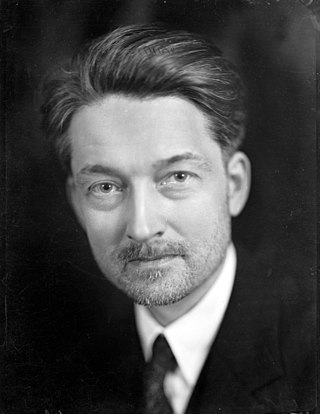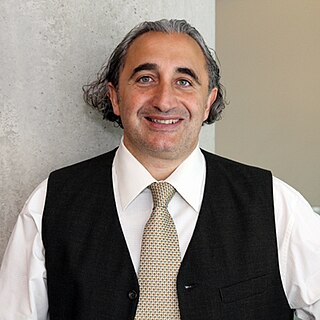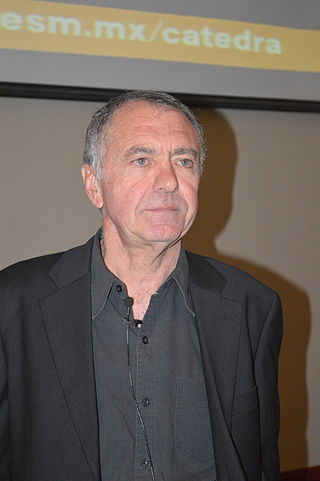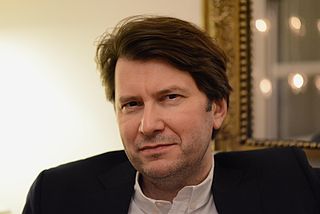
Maurice Jean Jacques Merleau-Ponty was a French phenomenological philosopher, strongly influenced by Edmund Husserl and Martin Heidegger. The constitution of meaning in human experience was his main interest and he wrote on perception, art, politics, religion, biology, psychology, psychoanalysis, language, nature, and history. He was the lead editor of Les Temps modernes, the leftist magazine he established with Jean-Paul Sartre and Simone de Beauvoir in 1945.

Erich Seligmann Fromm was a German-American social psychologist, psychoanalyst, sociologist, humanistic philosopher, and democratic socialist. He was a German Jew who fled the Nazi regime and settled in the United States. He was one of the founders of The William Alanson White Institute of Psychiatry, Psychoanalysis and Psychology in New York City and was associated with the Frankfurt School of critical theory.

Charles-Marie Gustave Le Bon was a leading French polymath whose areas of interest included anthropology, psychology, sociology, medicine, invention, and physics. He is best known for his 1895 work The Crowd: A Study of the Popular Mind, which is considered one of the seminal works of crowd psychology.

Consumerism is a social and economic order in which the aspirations of many individuals include the acquisition of goods and services beyond those necessary for survival or traditional displays of status. It emerged in Western Europe before the Industrial Revolution and became widespread around 1900. In economics, consumerism refers to policies that emphasize consumption. It is the consideration that the free choice of consumers should strongly orient the choice by manufacturers of what is produced and how, and therefore orient the economic organization of a society. Consumerism has been criticized by both individuals who choose other ways of participating in the economy and environmentalists concerned about its impact on the planet. Experts often assert that consumerism has physical limits, such as growth imperative and overconsumption, which have larger impacts on the environment. This includes direct effects like overexploitation of natural resources or large amounts of waste from disposable goods and significant effects like climate change. Similarly, some research and criticism focuses on the sociological effects of consumerism, such as reinforcement of class barriers and creation of inequalities.

Lambert Adolphe Jacques Quetelet FRSF or FRSE was a Belgian astronomer, mathematician, statistician and sociologist who founded and directed the Brussels Observatory and was influential in introducing statistical methods to the social sciences. His name is sometimes spelled with an accent as Quételet.

Joseph Marie, comte de Maistre was a Savoyard philosopher, lawyer, diplomat, and magistrate. One of the forefathers of conservatism, Maistre advocated social hierarchy and monarchy in the period immediately following the French Revolution. Despite his close personal and intellectual ties with France, Maistre was throughout his life a subject of the Kingdom of Sardinia, which he served as a member of the Savoy Senate (1787–1792), ambassador to Russia (1803–1817), and minister of state to the court in Turin (1817–1821).
Below is a list of philosophy articles from D-H.

Jacques Maritain was a French Catholic philosopher. Raised as a Protestant, he was agnostic before converting to Catholicism in 1906. An author of more than 60 books, he helped to revive Thomas Aquinas for modern times, and was influential in the development and drafting of the Universal Declaration of Human Rights. Pope Paul VI presented his "Message to Men of Thought and of Science" at the close of Vatican II to Maritain, his long-time friend and mentor. The same pope had seriously considered making him a lay cardinal, but Maritain rejected it. Maritain's interest and works spanned many aspects of philosophy, including aesthetics, political theory, philosophy of science, metaphysics, the nature of education, liturgy and ecclesiology.
Selfishness is being concerned excessively or exclusively for oneself or one's own advantage, pleasure, or welfare, regardless of others.

Serge Latouche is a French emeritus professor of economics at the University of Paris-Sud. He holds a degree in political sciences, philosophy and economy.

Geoffrey Franklin Miller is an American evolutionary psychologist, author, and associate professor of psychology at the University of New Mexico. He is known for his research on sexual selection in human evolution.
Freudo-Marxism is a loose designation for philosophical perspectives informed by both the Marxist philosophy of Karl Marx and the psychoanalytic theory of Sigmund Freud. Its history within continental philosophy began in the 1920s and '30s and running since through critical theory, Lacanian psychoanalysis, and post-structuralism.

Emmanuel Todd is a French historian, anthropologist, demographer, sociologist and political scientist at the National Institute of Demographic Studies (INED) in Paris. His research examines the different family structures around the world and their relationship with beliefs, ideologies, political systems, and historical events. He has also published a number of political essays, which have received broad coverage in France.

Gad Saad is a Canadian marketing professor at the John Molson School of Business at Concordia University. He has argued for applying evolutionary psychology to marketing and consumer behaviour. He wrote a blog for Psychology Today and hosts a podcast titled "The Saad Truth".

Gilles Lipovetsky is a French philosopher, writer, and sociologist, professor at Stendhal University in Grenoble, Auvergne-Rhône-Alpes, France.
Articles in social and political philosophy include:
Marxist humanism is an international body of thought and political action rooted in a humanist interpretation of the works of Karl Marx. It is an investigation into "what human nature consists of and what sort of society would be most conducive to human thriving" from a critical perspective rooted in Marxist philosophy. Marxist humanists argue that Marx himself was concerned with investigating similar questions.

Ghislain Deslandes is a philosopher born in Angers (France) on the 16th of August 1970.
Fernande Saint-Martin was a Canadian art critic, museologist, semiologist, visual arts theorist and writer. A graduate of the Université de Montréal and McGill University, her career began at La Presse in 1954 before being made editor-in-chief of Châtelaine magazine in 1960. Saint-Martin left the magazine in 1972 and was made director of the Musée d'art contemporain de Montréal. She was a professor and researcher at Université Laval and later Université du Québec à Montréal from 1979 to 1996. Saint-Martin wrote several books and essays, contributed to various art publications and was awarded the Molson Prize in Humanities and Social Sciences from the Canada Council for her work in semiology in 1989. She was also president of the International Association for Visual Semiotics from 1990 to 1994.

Romantic psychology was an intellectual movement that emerged in the late 18th and early 19th centuries in Europe, particularly in Germany. It was a response to the Enlightenment's emphasis on reason and rationality, which Romantic psychologists believed neglected the importance of emotions, imagination, and intuition in human experience.














